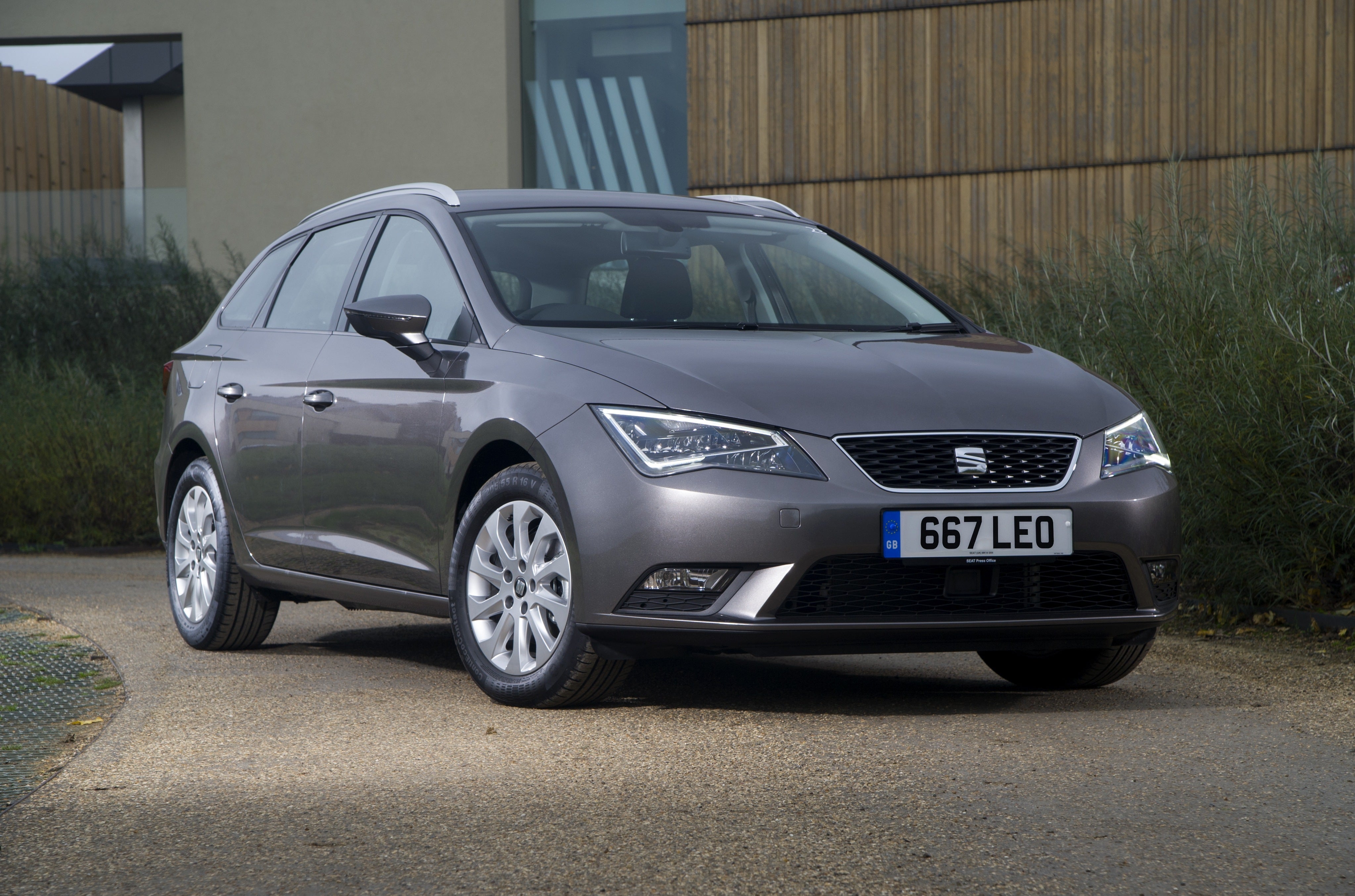SEAT Leon ST (2014-2020) Review
Written by Andrew Brady
Quick overview
Pros
- Substantial boot space for this size of the car, offering real practicality
- Stylish looks both inside and out, especially on sportier FR models
- Large choice of engines across the range
Cons
- Entry-level S model lacks the best gadgets and equipment
- Ride can be firm on cars fitted with optional 18-inch wheels
- SEAT badge lacks premium image of some rivals
Overall verdict on the SEAT Leon ST
"In this SEAT Leon ST review we're looking at a genuine alternative to the more mainstream brands in the compact estate segment. If you can look past the badge you might ordinarily dismiss you'll find a smart, spacious estate that is good to drive, well-equipped and solidly built. The biggest problem might be a lack of choice in the used market."
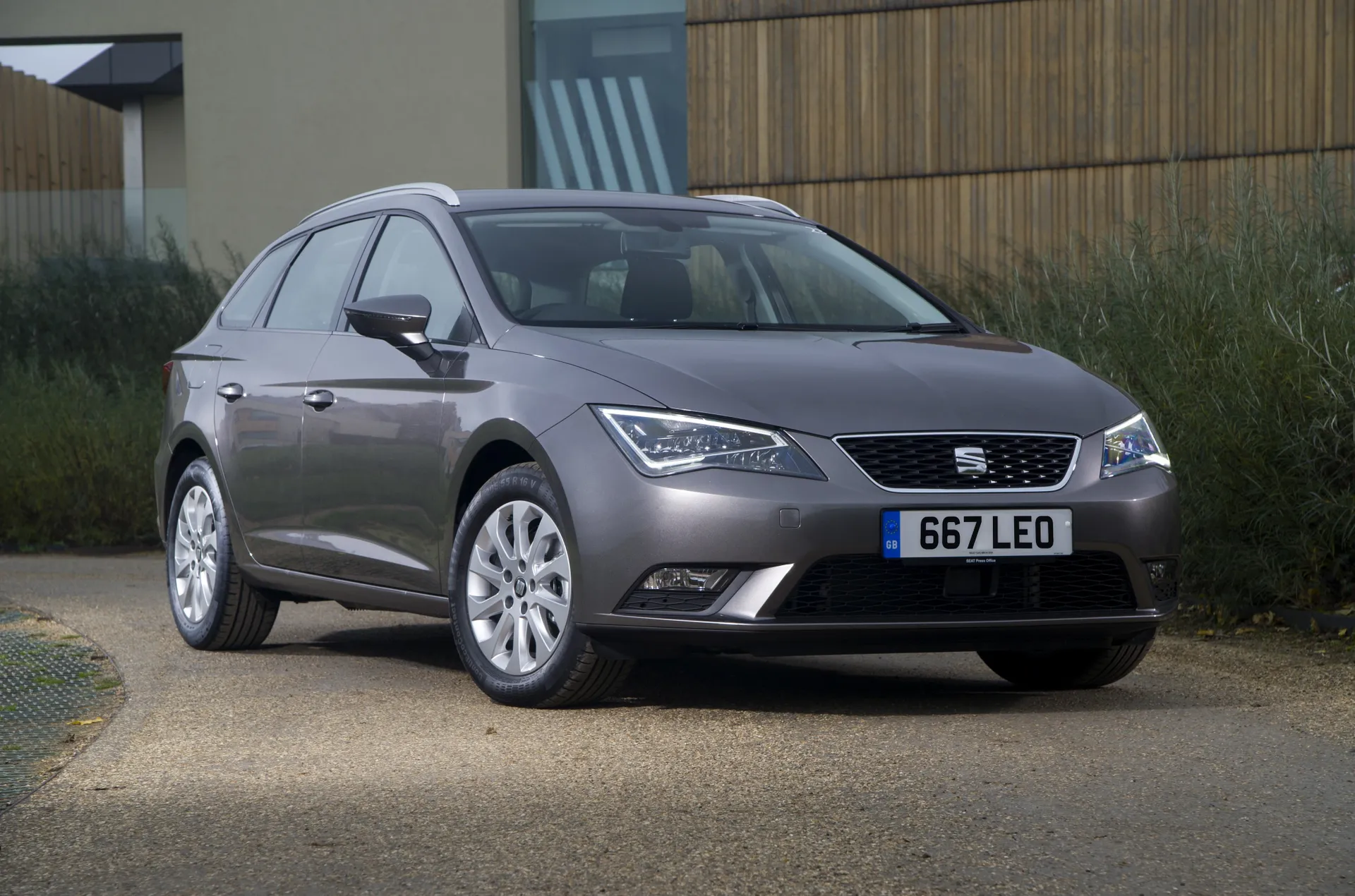
Forget your preconceptions about dowdy estate cars: the SEAT Leon ST proves can you add some style to family life. Based on the impressive SEAT Leon it keeps the sharp lines and angles that help it stand out from the crowd, plus it looks more than simply a stretched version of the regular hatchback.
Aside from the handsome design, what really makes the SEAT Leon ST a success is the ease with which it fits into your life. Presumably, you’re considering an estate because you need some extra space – and the SEAT Leon ST delivers that and more.
Dogs, luggage and flat-pack furniture can be accommodated in the Leon ST’s shapely posterior. Fold the rear seats down and the SEAT wagon can take up to 1,470 litres of luggage.
The family hatchback origins of the SEAT Leon ST mean that it sits between two different classes of car in terms of size. While notably bigger than Ford Focus-sized hatchbacks, it is still not as huge as a Ford Mondeo. That means plenty of space without the occasional dramas of manoeuvring a large car around a multi-storey car park. It also makes the SEAT Leon ST equally at home in the city or eating up miles on the motorway.
SEAT has often tried to add ‘emotion’ to its cars, and the Leon ST is no different. It’s genuinely enjoyable to drive, especially in sportier FR trim. However, all versions add enough entertainment to ensure you don’t get bored behind the wheel, even if it’s just a trip to the recycling centre.
A broad selection of engines is available for the Leon ST. These range from the diminutive three-cylinder 1.0-litre TSI petrol with a useful 115PS, through to a 2.0 TSI with 190PS. Diesels are also available if you prefer, with the 184 PS 2.0 TDI very capable of shifting all the junk in your trunk. All engines offer upwards of 45mpg in official tests, with the 1.6-litre diesel capable of up to 70mpg.
SEAT also offers the Leon ST in performance Leon Cupra specification, along with the off-road-focused X-Perience model. However, we have concentrated on the core SEAT Leon ST range here, rather than these more specialist models.
Inside the Leon ST, SEAT has been generous with standard equipment. Even the most basic S version comes with air conditioning, central locking, Bluetooth connectivity for your phone and an alarm. Higher-spec cars feature cruise control, LED lights, and satellite navigation among their standard features.
In short, the SEAT Leon ST offers a reasonably priced estate, brimming with usable space and features. The handsome looks and sporty drive also help allay any reluctance at having to choose a practical car.
Looking for a used car for sale? We've got 100s of SEAT Approved Used Cars for Sale for you to choose from, including a wide range of SEAT Leon ST cars for sale. If you're looking for the newer version, you need our SEAT Leon Estate review.
Is the SEAT Leon ST right for you?
Looking for a family estate that offers all the space of a big car, but without the compromises? The SEAT Leon ST might be perfect for you. The handsome looks are no barrier to hauling all the assorted detritus of daily life, making it a winner for those who want style and space.
In particular, the SEAT Leon ST appeals to those who need extra room, but want to buck the trend for buying an SUV. It has all the practicality, and more, of an off-roader, but without the associated image (a good or bad thing, depending on your opinion).
SEAT models also tend to be relatively affordable and well equipped, not least versus the Volkswagens they share platforms and engines with. This helps make the SEAT Leon ST a good choice for those who like to get more for their money.
What’s the best SEAT Leon ST model/engine to choose?
For those doing shorter journeys, the four-cylinder petrol engines in the SEAT Leon ST are more than sufficient. The 150PS 1.5 TSI is the pick of the bunch, offering a combination of useful performance without breaking the bank on fuel economy.
SEAT offers a choice of a manual gearbox or the snappy DSG automatic. Both are well suited to the Leon ST, with no major downsides to either (only that the DSG is more expensive).
To make the most of the SEAT Leon ST’s value for money, we’d recommend opting for SE specification. This adds alloy wheels and chrome roof rails to the exterior, along with features such as cruise control, front fog lights and fancier interior trim. It will feel like you have bagged a bargain.
What other cars are similar to the SEAT Leon ST?
The biggest rivals to the SEAT Leon ST are the ones it shares its platform with. The Volkswagen Golf Estate has a similar formula as the Leon ST, but the posher Volkswagen badge on the bonnet means you will pay more to own one.
In estate form, the Skoda Octavia has even more luggage space than the Leon ST, but not the same handsome looks. For some, the Skoda badge still remains a problem, despite the decades of progress made by the brand.
The Ford Focus Estate and Peugeot 308 SW are other estates to consider, particularly with an eye on value.
Comfort and design: SEAT Leon ST interior
"Sharing a design and layout with the regular Leon hatchback means the inside of the ST will be familiar territory for SEAT fans. This is not a bad thing, as thousands of happy Leon owners could testify."
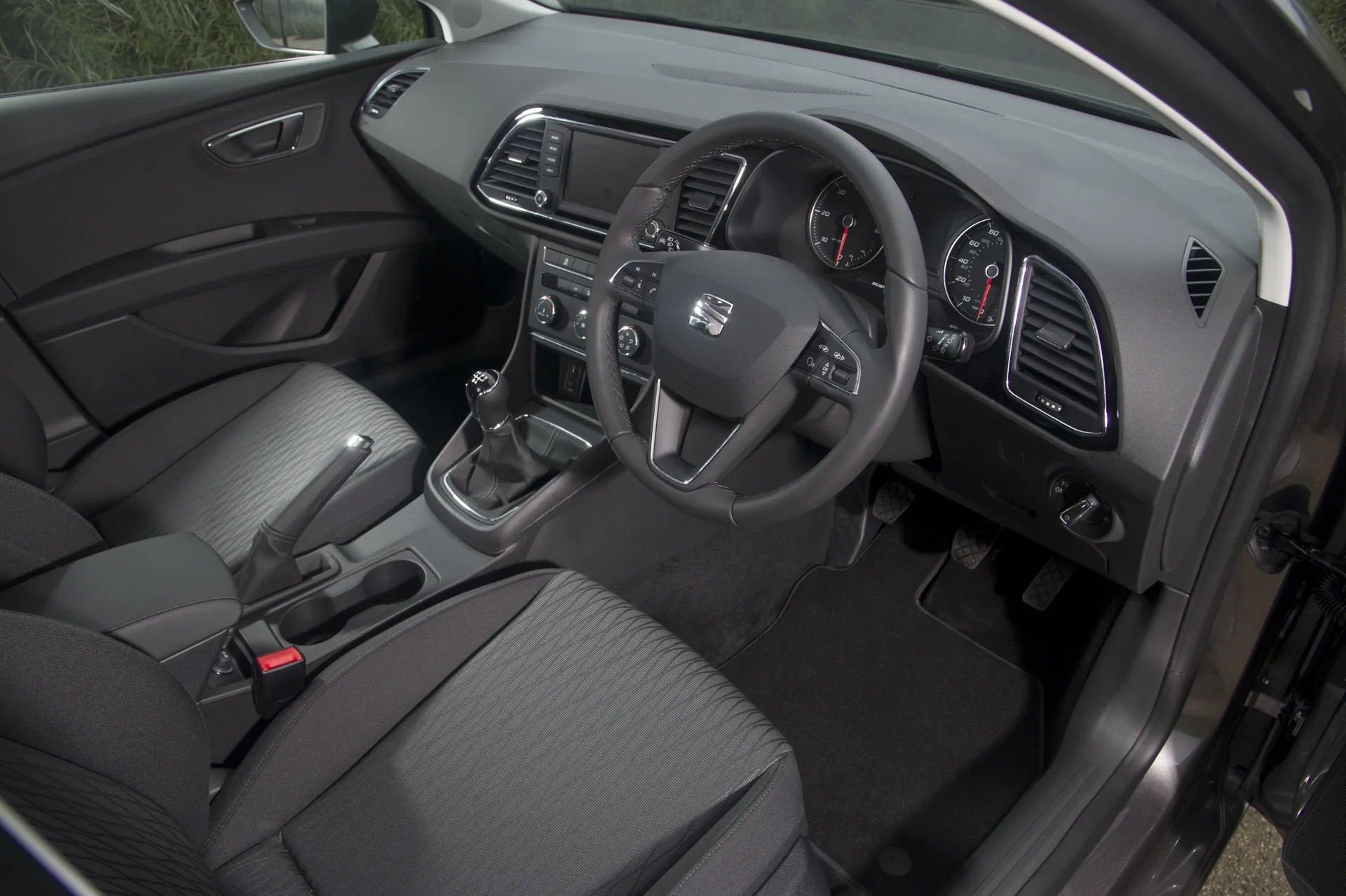
The centre console is angled slightly towards the driver, hinting ever so slightly at the sporting undertones of the SEAT Leon. It offers the added bonus of making it easier for the driver to see the multimedia screen, and change the various settings on it.
For those in the front, the standard seats are generally a good fit. All drivers should be able to make themselves comfortable behind the steering wheel, with no major flaws in the driving position. SE, FR and Xcellence trim cars get additional lumbar adjustment, along with height adjustment for front passengers.
Although there is a lot of black plastic inside, the overall design of the SEAT Leon ST’s interior is fairly pleasing to the eye. Don’t expect too much fancy trim – remember the ST is built to be affordable – and the overall effect is easy to live with.
Unlike some cars, the SEAT Leon ST has relatively few buttons on its dashboard. The standard touchscreen controls most of the major functions, with the heating and ventilation left to separate dials. It might not be the most exciting place to be, but it will be easy to use from the moment you sit down.
Quality and finish
Remembering the relative cost of the SEAT Leon ST means the overall interior fit and finish is amply good enough. Whilst there may be a lot of black plastic, it feels solid and ready for the long haul.
Aside from the basic S version, SE, FR and Xcellence models get extra brightwork to help lighten the mood inside. This consists of additional chrome detailing, along with a greater choice of upholstery colours and materials.
SE models and upwards gain leather trim covering the handbrake, gear knob and steering wheel. The FR version goes one better with perforated leather for the steering wheel, which itself has a sporty, flat-bottomed design.
On facelifted models, the expensive Xcellence version added standard leather trim for the Leon ST’s seats. LED lighting was also included to boost the feeling of quality, with even the aluminium covers for the front doors gaining illuminated logos.
Open the boot and the Leon ST has chrome trim covering the loading sill. It offers a degree of protection for sliding large items into the boot.
Infotainment: Touchscreen, USB, nav and stereo in the SEAT Leon ST
All versions of the SEAT Leon ST come with a multimedia touchscreen as standard. This began as a 5.0-inch unit in the earliest cars, with an optional 5.8-inch display offered as part of the Media System Plus option pack.
Following the 2017 facelift, the size of the screen was expanded to an 8.0-inch unit, but both versions offer a user-friendly and intuitive experience.
The main touchscreen sits at the top of the dashboard, allowing it to be easily adjusted without having to look down and away from the road. Standard equipment also includes a digital display in between the dashboard dials, allowing for functions to be changed via the steering wheel-mounted controls.
Earlier models used ‘hard’ buttons to switch between functions on the touchscreen, with facelift cars using ‘virtual’ buttons instead. This makes operation slightly more difficult without the tactile feedback, but is something that becomes familiar with time. Volume is controlled by a rotary knob in all versions, making it easy to ‘go loud’ when your favourite song comes on the radio.
USB and auxiliary connections are standard on earlier models, and supplemented by full Apple CarPlay and Android Auto connectivity in later cars. Bluetooth is also available to stream music from your smartphone, with an MP3-compatible CD player housed in the glovebox.
Space and practicality: SEAT Leon ST boot space
Roominess is where the SEAT Leon ST scores big for a family estate. Up the front there is plenty of space, plus useful stowage options.
Standard equipment includes two cupholders in the centre console, with all doors featuring pockets large enough to take bottles of water. SE trim and upwards gain an armrest with integrated storage, plus neat hidden cubbies beneath the front seats.
Those in the rear also get a good deal. Although the bench seat may start to feel a little cramped with three adults, it is more than fine for short journeys. Headroom and legroom are unlikely to be a concern.
With the rear seats in use, you can fit up to 587 litres of luggage in the boot. Fold the seats flat, and the load space increases to a substantial 1470 litres.
The rival Volkswagen Golf Estate betters these figures slightly: 605 litres with the rear seats up, and 1620 litres with them folded flat. However, the Golf does cost more than a SEAT Leon ST, whether you buy new or second-hand.
On SE trim and above, the rear seats can be dropped simply by pulling levers just inside the rear boot hatch. It makes life easier when trying to load hefty items, obviating the need to open the rear doors.
Also making life easier is a split-level boot floor. Standard on all versions, it creates a completely flat loading area, making it easier to slide big items in and out. It also offers space to store items underneath when on its highest setting, which adds to the usefulness of the SEAT Leon ST’s rear.
The SEAT Leon ST dimensions are 4535mm long, 1816mm wide and 1459mm tall.
Handling and ride quality: What is the SEAT Leon like to drive?
"It may have sporty looks, but beneath its stylish exterior the SEAT Leon ST is still very much a practical family vehicle. That means its handling errs towards stable and secure rather than agile entertainment, but there’s still enough to interest keener drivers."
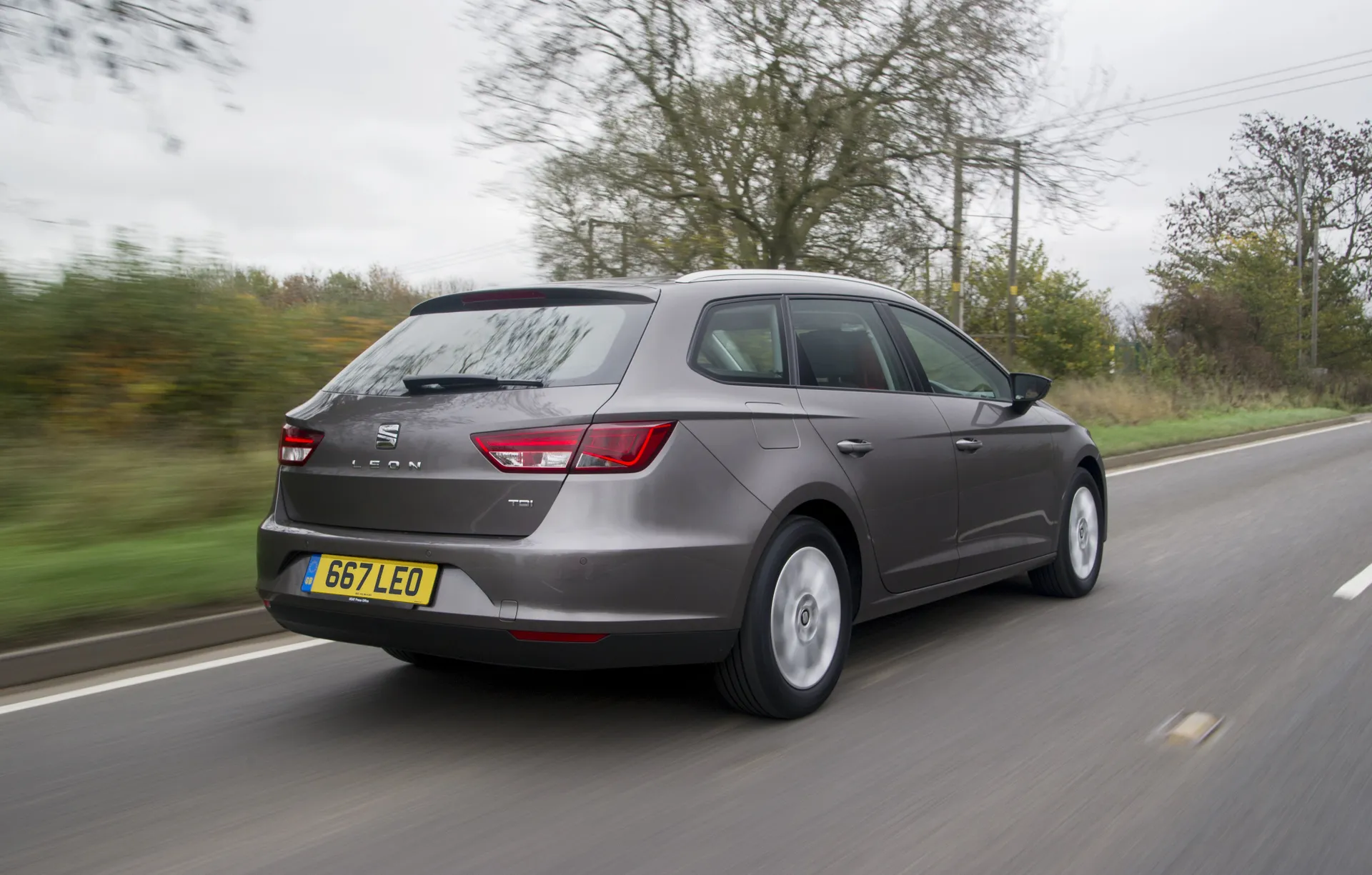
The steering in the SEAT Leon ST is light, even with the largest wheel options. Drivers can place the car with confidence on country roads, with reassuring levels of grip. The easy steering is also helpful around town, with the car simple to weave through traffic. Motorway miles are handled with ease, too.
A technical point to note is that all SEAT Leon STs with engine outputs lower than 150PS have a simpler rear suspension setup. Without delving into the technicalities, this means that versions with more powerful engines benefit from a slightly more refined ride quality. However, the suspension used on lower-powered models is still quite adequate, and drivers are unlikely to notice the difference in normal driving conditions.
Cars in FR trim gain stiffer sports suspension over the rest of the range, making these the best handling of the bunch. Opting for an FR model also meant 17-inch alloy wheels as standard, with 18-inch items available as an option.
Although the sports suspension adds a little extra stiffness, SEAT Leon STs in FR specification are still comfortable for everyday use. The bigger 18-inch wheels, with their accompanying low-profile tyres, naturally do transmit road imperfections back to the cabin more.
SE models with their 16-inch alloy wheels and comfort suspension offer the smoothest ride, but avoid the cheap-looking steel wheels of the S version.
What engines and gearboxes are available in the SEAT Leon ST?
SEAT launched the Leon ST in the UK with a wide range of engines borrowed from the regular hatchback model. Both petrol and diesel engine options are included, but there is no hybrid version of this Leon.
A 1.2-litre TSI four-cylinder petrol marked the initial entry into Leon ST ownership. With its 105PS and relatively low weight, it makes for reasonable progress and frugality. A three-cylinder 1.0 TSI petrol engine was introduced later, offering more power (115PS) and an improvement in fuel economy. Win-win.
The 1.4-litre TSI and later 1.5-litre TSI four-cylinder petrol engines make the best case for themselves in the Leon ST. Earlier 1.4 engines have 140PS, making a noticeable step up in performance. Offered with 130PS and 150PS options, the 1.5 engine added additional refinement when introduced as part of a facelift.
Diesel engines include 1.6-litre TDI and 2.0 TDI four-cylinder options. The smaller 1.6 TDI is fine for shorter journeys, but those hitting the motorway may appreciate the added oomph of the 2.0-litre version and its 150PS.
FR-trim cars also have a range of exclusive engines. These included a powerful 180PS 1.8-litre petrol, which the facelift saw replaced with a 190PS 2.0-litre TSI unit. The 184PS 2.0 diesel is top dog for those filling up at the black pump.
The standard manual gearbox is light and easy to use, as is the clutch. Optional on most models is a DSG automatic gearbox, including steering wheel-mounted paddles for gearshifts.
Refinement and noise levels
SEAT models fit into a regimented framework within the Volkswagen Group family, meaning there will always be some differences between the various brands. Drive a SEAT Leon ST back-to-back with the equivalent Volkswagen Golf and you may notice minor increases in road noise and vibration levels.
However, this is all relative, and the refinement behind the wheel of the SEAT Leon ST will be good enough for most drivers. Small wing mirrors help reduce the overall amount of wind noise, while tyre rumble is well contained. FR cars with the bigger 18-inch alloy wheels and fatter tyres will generate slightly more noise from where the rubber meets the road.
Engine noise from all versions is well contained. The diesels have a natural clatter on first starting up, but are otherwise quiet and smooth when on the move. Petrol models are also refined, but those in search of aural excitement should again seek the FR versions.
These come with a Drive Profile Select, allowing the driver to choose between Eco, Normal, and Sport modes. Engaging Sport mode results in extra engine noise being generated in the cabin, along with quicker throttle response and more weight for the power steering.
Safety equipment: How safe is the SEAT Leon ST?
SEAT was suitably proud of the Leon ST for achieving the full five stars for crash protection when tested by Euro NCAP. Helping this top score is a full suite of airbags, including curtain airbags and a ’bag for the driver’s knees.
Other standard safety equipment includes traction control and electronic stability control. Post-collision braking is also fitted to all models, while SE-trim cars and above gain hill-hold assist and SEAT’s XDS electronic differential lock.
Front and rear parking sensors are standard on FR versions. The post-facelift Xcellence model went one better by adding a reversing camera. Visibility when parking the Leon ST is generally good, but the sensors do help when negotiating tight spots.
Other options include LED headlights on certain trim levels, along with a Safety Pack that includes tiredness recognition and seat belt reminders for those sitting in the back seats. Additional side airbags can also be specified for rear-seat passengers.
The SEAT Leon ST has ISOFIX mounting points provided on the outer two rear seats, combined with top tether anchorages, both for fitting child car seats.
An emergency ‘get you home’ compressor kit is fitted as standard instead of a spare wheel. However, it does have the space to take a space saver wheel beneath the boot floor, making this a useful option to have.
MPG and fuel costs: What does the SEAT Leon ST cost to run?
"The wide choice of engines means there is likely to be a SEAT Leon ST version to suit all particular needs when it comes to fuel economy. The 1.0 TSI petrol is the smallest engine offered and can deliver 64mpg on combined testing cycle. Even the popular 150PS 1.5 TSI petrol returns 55mpg."
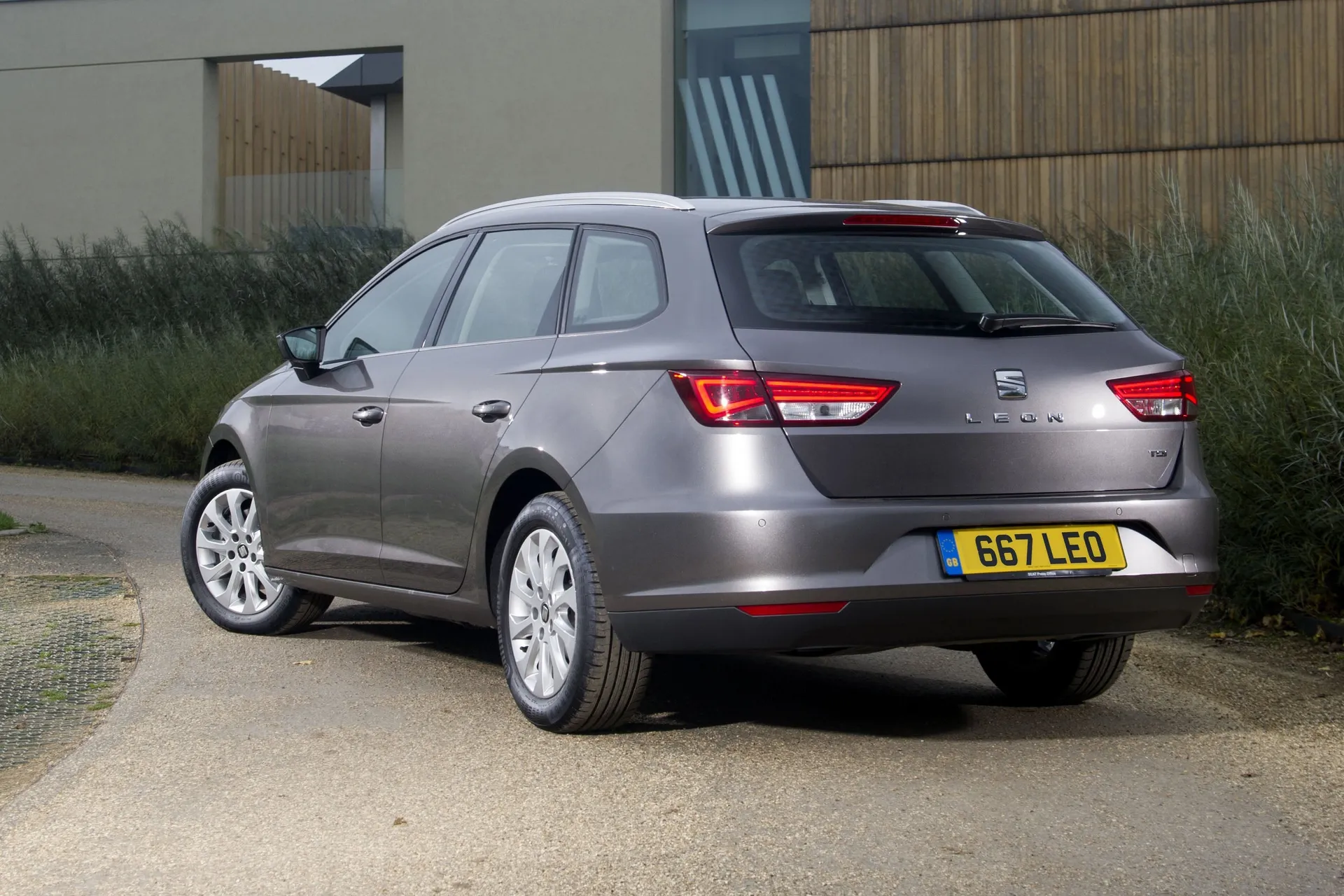
Those making regular long journeys on the motorway may find a diesel suits their needs better. In particular, the 110PS 1.6 TDI Ecomotive engine can achieve up to almost 79mpg. And the more powerful 184PS 2.0 TDI can achieve 61mpg.
Note that all the above figures were obtained using the old, and less realistic, NEDC test. Fuel economy figures for the current WLTP test tend to be slightly lower.
How reliable is a SEAT Leon ST?
The SEAT Leon scored an impressive 9.45 out of 10 for reliability in the HonestJohn.co.uk Satisfaction Survey, making it one of the best performing SEATs in the range and better than some of its well-established rivals.
SEAT finished a more disappointing 22nd out of 30 manufacturers overall in the same survey.
Insurance groups and cost
A SEAT Leon ST is unlikely to be the first choice for new drivers, with its relative size making it better suited to more experienced road users. However, keeping insurance costs low may still be a consideration.
Cars in S trim, powered by the 1.2 TSI 105PS petrol engine, are the cheapest to insure at group 12. Conversely, the 184PS 2.0 TDI clocks in as the model with the highest insurance group, rated 26. All versions of the Leon ST do come fitted with an alarm and engine immobiliser as standard, plus deadlocks for the remote central locking.
VED car tax: What is the annual road tax on a SEAT Leon ST?
Having been on sale from 2014, the Leon ST has crossed different VED tax regimes in the UK. For cars registered before April 2017, the Leon ST with the 1.6 TDI Ecomotive diesel engine achieves an impressive 94g/km of CO2. Falling inside Band A means free VED for this particular model. The maximum potential VED on pre-April 2017 cars is Band E, taken by the 1.8 TSI petrol.
For cars registered after April 2017, all fall within the bracket of paying £165 per year. First-year rates vary between £175 and £540, with the 2.0 TSI petrol responsible for the largest figure of all.
How much should you be paying for a used SEAT Leon ST?
"When launched back in 2014, prices for the Leon ST began at £16,675 for the 1.2 TSI model in S trim. This made it more than £2,800 cheaper than the equivalent Volkswagen Golf Estate. Today, the bulk of used models are available for less than £16,000."
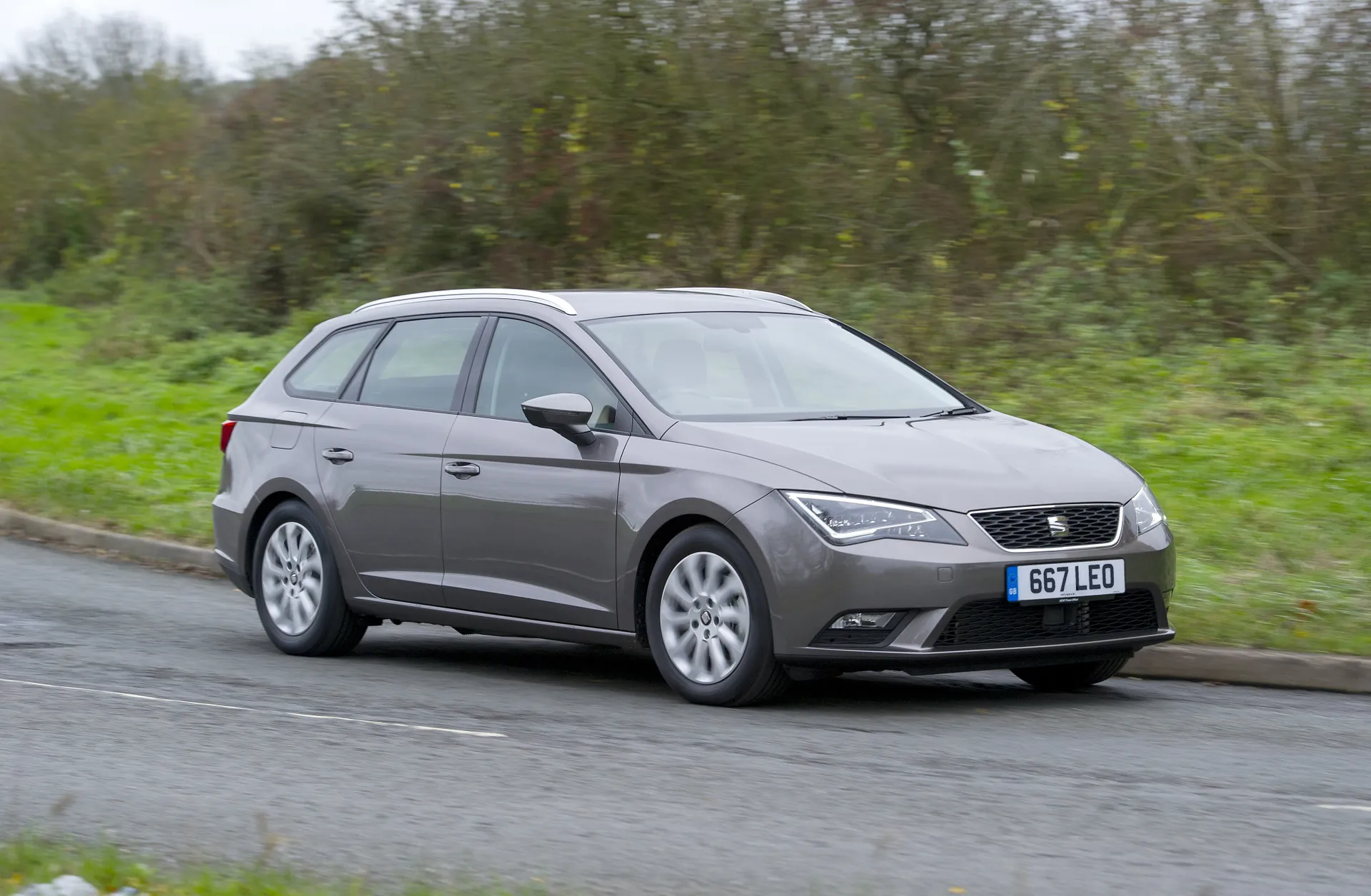
Cars like the SEAT Leon ST find favour with fleet buyers, meaning there is often a decent supply of them in nearly-new condition. These may be less than one-year-old and with limited mileage, presenting an affordable way to get behind the wheel.
Pre-registered cars are also a worthwhile option to pursue, with dealerships typically able to supply a decent stock of them. Leon STs with the 1.5 TSI petrol engine in FR Sport trim make for particularly good value as a pre-registration model, while the range-topping Xcellence version can easily be found as well.
Due to its popularity, the Leon ST is plentiful on dealer forecourts. This means you should hunt out the best possible deal, rather than simply buying the first car you see.
Trim levels and standard equipment
Having been sold for a number of years, the SEAT Leon ST is available in multiple trim levels and with various special edition models. Standard SEAT Leon ST S specification brought 15-inch steel wheels, air conditioning, a colour touchscreen, black roof rails and a wealth of airbags and other safety equipment. SEAT discontinued the S model in 2017, and it is best avoided when other versions cost little more.
SEAT Leon ST SE added cruise control, leather trim for the steering wheel, plus chrome details inside and 16-inch alloy wheels. SEAT Leon ST FR brings sportier bumpers, 17-inch alloy wheels, sports seats and dual-zone climate control, among other changes.
Introduced later, the range-topping SEAT Leon ST Xcellence trim means standard leather seats, full LED headlights, keyless entry and a unique chrome front grille.
Opting for a car in SE specification delivers all the equipment the average Leon ST driver will need, while those wanting a sportier experience will be pleased with the FR version.
Ask the heycar experts: common questions
What is a SEAT Leon ST?
Which SEAT Leon is the fastest?
What problems do SEAT Leons have?
Get our latest advice, news and offers
Keep me updated by email with the latest advice, news and offers from heycar.
By submitting you agree to our privacy policy
